
After completing residency, you’re finally ready to take the next step in your career as a physician. Most new doctors will take a full-time position or go on to a fellowship, but those aren’t the only options out there. Sometimes, taking a different path — like choosing to do international locum tenens out of residency — can have huge benefits. Here’s why international locums is a great way to start your career as a practicing physician.
1. You’ll gain useful clinical experience
Practicing medicine in another country can expose you to ailments or treatments you haven’t experienced during your training, making you a more well-rounded physician.
Dr. Bryan Zorko accepted a locums assignment in Guam after finishing residency. As an emergency medicine and critical care physician, he says he’s learned a lot working in the U.S. territory.
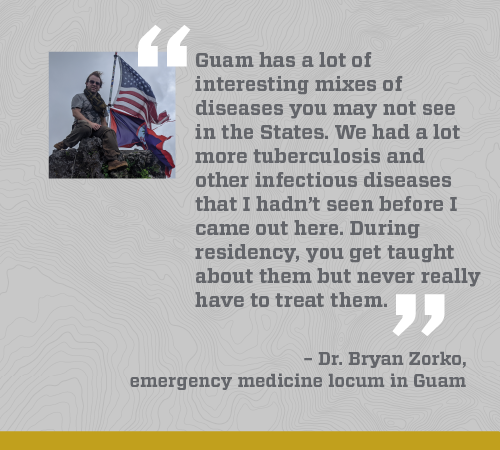
“Guam has a lot of interesting mixes of things you may not see in the States. We had a lot more tuberculosis than I was used to seeing, and there are some infectious diseases like leptospirosis that I hadn’t seen before I came out here.” During residency, he says, “You get taught about them, but you never really have to treat them.”
While on assignment in Australia, family medicine physician Dr. Mike Spertus gained further training in skin cancer, one of his medical interests. “Probably 20% of my cases are skin cancer. It’s a fairly large portion of my practice, which is what I wanted,” he says, adding that he could do extra training in skin cancer protocols during his assignment.
Family medicine physician Dr. Jason Heine explained that while working his locums assignment in New Zealand, he saw more patients with skin cancer, leading to him learning new ways to treat it. “I used a small, handheld medical device to view people’s skin under high magnification while practicing the new skill, something I never would’ve had access to in the U.S. I was able to bring the skill back to my practice in the States, and I’ve been able to see my colleagues’ patients with skin lesions they are unsure about.”
Dr. Samantha Conroy, family medicine and obstetrics physician, credits her international and locums work — particularly in remote and rural areas — with strengthening her confidence in her skills as a practitioner.
“Working in remote communities really stretched me in terms of being comfortable with my training. When you don’t have all these tests at your fingertips, you must rely more on your exam and your clinical judgment and make decisions based on what you see in front of you,” says Dr. Conroy. “It does help you become a better doctor. Relying on your training is really good.”
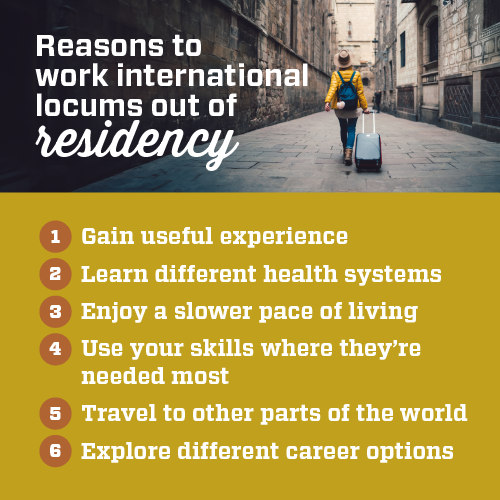
2. You’ll learn about different health systems
In addition to growing your clinical skills, choosing international locum tenens assignments can also expose you to new healthcare management methods.
Family medicine physician Dr. Brad Hardee spent six months practicing medicine in New Zealand after finishing his residency, and he says he still thinks about how things were done over there. “I was able to practice medicine based on the patient’s best interest, not on what insurance and pharmaceutical companies want us to do. I definitely didn’t understand socialized medicine before going, but I can see how there’s less stress on doctors, nurses, and patients,” he says.
Australia has a similar healthcare system, and Dr. Spertus says it made his experience much more enjoyable. “Everything at our clinic is pretty much a bulk-billing practice to the government. It makes billing super simple,” he says.
“From Kenya to Alaska to New Zealand, I’ve spent time in three different medical situations and ways of practicing medicine, and each is very different,” says Dr. Conroy. “All have really good things and a few not-so-good things. I believe that broad exposure to medicine, in general, makes you a better doctor and gives you a range of experience that you might not get if you stick in the same place the whole time.”
3. You’ll appreciate a slower pace of life
Many countries approach work and time off differently than we’re used to in the U.S., and this extends to physicians as well. Providers working internationally often find they have shorter hours and more time to enjoy life outside of work. It’s a great way to recharge your personal battery after the grueling pace of training.
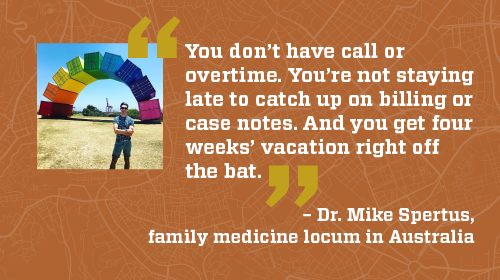
“You don’t have call-time or overtime,” says Dr. Spertus about his position as a general practitioner in Australia. “You’re not staying late to catch up on billing or case notes. And you get four weeks of vacation right off the bat.”
Family medicine physician Dr. Myra Dimitrov loves the flow of patients, saying she usually sees a maximum of 15 patients per day and appreciates the time she can spend with each patient. She also says her schedule suits her. “We work eight to five, but we have two hours of administrative time a day, then an hour lunch, and a scheduled 10-minute tea break.”
4. You’ll apply your skills where they’re needed most
It’s common for international locums assignments to be in areas where physicians are needed because of healthcare provider shortages. healthcare access is limited. New practicing physicians who want to give back to the community find they will be able to do so while on a locum tenens assignment.
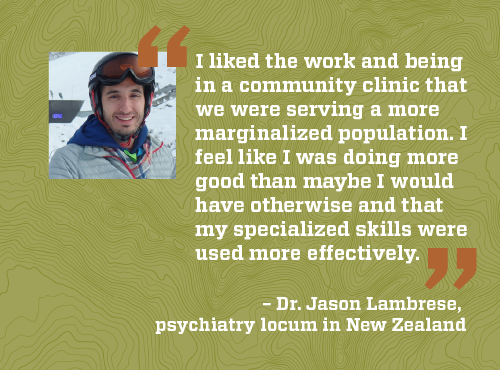
Dr. Jason Lambrese, a child and adolescent psychiatrist, used his training to care for underserved kids in New Zealand. “I liked the work and being in a community clinic and that we were serving a more marginalized population,” he says. “I feel like I was doing more good than maybe I would have otherwise, and that my specialized skills were used more effectively.”
5. You’ll get to see new parts of the world
While international locums is primarily about the work, many physicians are also drawn to the opportunity to travel and learn more about a new culture.
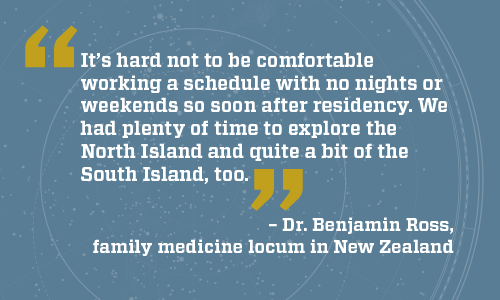
Dr. Benjamin Ross, a family medicine physician who took a locums assignment in New Zealand, says he was able to explore the country in his free time. “It’s hard not to be comfortable working a schedule with no nights or weekends so soon after residency,” he says. “We had plenty of time to explore the North Island and quite a bit of the South Island, too.”
6. You’ll have time to explore your career options
After years of training, it can feel like taking a permanent full-time job is the logical next step. But taking some time to reflect on what you really want can help ensure a better fit once you do sign a contract.
“I did six years of residency and fellowship, and the idea of taking an international locum tenens assignment as kind of a gap year between my fellowship and a more permanent job was really appealing,” says Dr. Lambrese.
Dr. Hardee agrees, adding, “Doing locums right out of residency was the best decision I’ve made in a long time. My medical school buddies all wish they would have done something like New Zealand before settling into family medicine practice.”
International locum tenens out of residency
Physicians who’ve chosen to work international locums right out of residency say they appreciate the new skills, perspectives, and landscapes their assignment has given them. Whether they switched to a permanent position or continued to work locums, they feel they’re better doctors after practicing medicine abroad.
Dr. Conroy has the following advice for physicians considering taking a locum tenens assignment: “Be open to going places that you haven’t been before. It can seem a little bit daunting to go to places like Barrow, Alaska, or travel overseas, but in the end, it is a really great experience, and just having those experiences is what makes life interesting.”
Want to learn if international locums out of residency would work for you? Give us a call at 1.800.760.3174 or view today’s locum tenens job opportunities.



 Back
Back